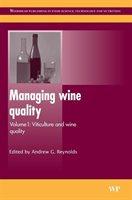Many aspects of both grape production and winemaking influence wine sensory properties and stability. Progress in research helps to elucidate the scientific basis of quality variation in wine and suggest changes in viticulture and oenology practices. The two volumes of"Managing wine quality" review developments of importance to wine producers, researchers, and students. The focus is on recent studies, advanced methods and likely future technologies. Part one of this book opens with chapters reviewing the impact of different winemaking technologies on quality. The contributors cover topics such as yeast and fermentation management, enzymes, ageing on lees, new directions in stabilization, clarification and fining of white wines and alternatives to cork in wine bottle closures. Part two focuses on managing wine sensory quality. Authors consider issues such as cork taint, non-enzymatic oxidation and the impact of ageing on wine flavour deterioration. The volume concludes with chapters on the management of the quality of ice wines and sparkling wines- Reviews current understanding of wine aroma, colour, taste and mouthfeel- Details the measurement of grape and wine properties through instrumental analysis, must and wine, and sensory evaluation- Examines viticulture and vineyard management practices, fungal contaminants and processing equipment
-
- Categories
- Architecture
- Art
- Cars & Motorcycles
- Design
- DIY & Crafts
- Education
- Film, Music & Books
- Fitness
- Food & Drink
- Gardening
- Geek
- Hair & Beauty
- History
- Holidays & Events
- Home Decor
- Humor
- Kids
- Women's Fashion
- Men's Fashion
- Leisure & Outdoors
- People
- Photography
- Products
- Science & Nature
- Sports
- Technology
- Travel & Places
- Weddings
- Other
- Property
- Animal
- Celebrities
- Health & Fitness
- Illustrations & Posters
- Quotes
- Services
- Renovation
- Home Building
- Business
- Toys
- New
- Popular
- Gifts
- Videos
- Help / Contact Us
- Terms & Privacy
- What is InterestPin


